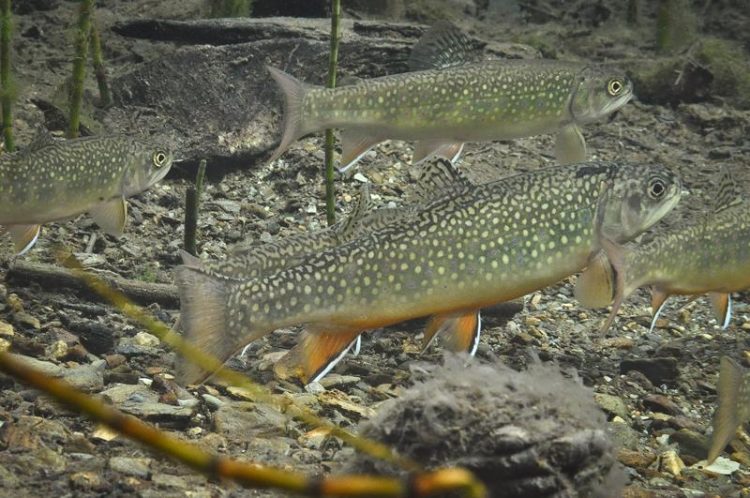SalmoInvade to Study the Effects of Recreational Fishing on Salmonids

Brook charr France Photo: Gael Grenouillet
“One of the aspects we plan to investigate is whether recreational fishing can act as protection for local populations of salmon and trout,” says project coordinator Professor Jörgen Johnsson of the Department of Biological and Environmental Sciences, University of Gothenburg.
Around 10% of people in Sweden carry out some form of recreational fishing, making it one of the most popular leisure activities in the country. Such fishing is important also from an economic point of view, with an annual turnover of approximately SEK 2.5 billion.
A group of scientists from Sweden, Norway, Germany, France and Canada is to study the biological invasion of salmonids in Europe in the recently started European project SalmoInvade. The project will run for three years and will evaluate the effects of non-native salmon species in Europe, and study the social, economic and ecological mechanisms that affect their ability to invade.
Anglers throughout Europe are associated with the project, which will also study cultural differences between Scandinavia and continental Europe in the way salmonids are viewed as a resource. The project is multidisciplinary and the composition of the research group has thus been designed to provide biological, sociological and psychological expertise.
Scientists in the SalmoInvade project are also planning to investigate whether escaped or released farmed fish can out-compete native populations of salmonids. Farmed fish have been genetically modified and they often have the property of eating a lot and eating rapidly. This may lead to less food being available for the native population.
“Scientists would like to determine the conditions in which the farmed fish will out-compete the wild population. This is one of the issues we are going to study,” says Jörgen Johnsson.
Anglers often prefer the fish to be large, and this may help to protect wild salmon, for example where rapidly growing farmed fish are found together with a wild population. In addition, farmed fish often behave less circumspectly than wild fish, and probably end up getting caught more often.
says Jörgen Johnsson. Angling clubs throughout Europe are taking part in the project, including Sportfiskarna Region Väst at Delsjön in Gothenburg.
“The experiments in Gothenburg will actively involve anglers from western Sweden, and we plan to use their special knowledge. This is a unique collaboration and we are eagerly looking forward to it,” says Jörgen Johnsson
The goal of SalmoInvade is to develop policy guidelines for the management of invasions of salmonids in Europe.
Contact:
Professor Jörgen Johnsson, Department of Biological and Environmental Sciences, University of Gothenburg.
Tel.: +46 31 786 3665, Mobile: +46 73 778 0375
E-mail: jorgen.johnsson@bioenv.gu.se
http://science.gu.se/english/News/News_detail/?languageId=100001&contentId=1…
Media Contact
More Information:
http://www.gu.seAll latest news from the category: Ecology, The Environment and Conservation
This complex theme deals primarily with interactions between organisms and the environmental factors that impact them, but to a greater extent between individual inanimate environmental factors.
innovations-report offers informative reports and articles on topics such as climate protection, landscape conservation, ecological systems, wildlife and nature parks and ecosystem efficiency and balance.
Newest articles

Sea slugs inspire highly stretchable biomedical sensor
USC Viterbi School of Engineering researcher Hangbo Zhao presents findings on highly stretchable and customizable microneedles for application in fields including neuroscience, tissue engineering, and wearable bioelectronics. The revolution in…

Twisting and binding matter waves with photons in a cavity
Precisely measuring the energy states of individual atoms has been a historical challenge for physicists due to atomic recoil. When an atom interacts with a photon, the atom “recoils” in…

Nanotubes, nanoparticles, and antibodies detect tiny amounts of fentanyl
New sensor is six orders of magnitude more sensitive than the next best thing. A research team at Pitt led by Alexander Star, a chemistry professor in the Kenneth P. Dietrich…





















